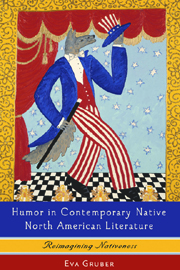Book contents
- Frontmatter
- Contents
- Preface and Acknowledgments
- Introduction
- 1 Humor in Native North American Literature and Culture: Survey
- 2 Reimagining Nativeness through Humor: Concepts and Terms
- 3 Expressing Humor in Contemporary Native Writing: Forms
- 4 Humor at Work in Contemporary Native Writing: Issues and Effects
- Conclusion
- Appendix: The State of Research on Humor in Native Writing
- Works Cited
- Index
2 - Reimagining Nativeness through Humor: Concepts and Terms
Published online by Cambridge University Press: 12 September 2012
- Frontmatter
- Contents
- Preface and Acknowledgments
- Introduction
- 1 Humor in Native North American Literature and Culture: Survey
- 2 Reimagining Nativeness through Humor: Concepts and Terms
- 3 Expressing Humor in Contemporary Native Writing: Forms
- 4 Humor at Work in Contemporary Native Writing: Issues and Effects
- Conclusion
- Appendix: The State of Research on Humor in Native Writing
- Works Cited
- Index
Summary
THE FOLLOWING CHAPTER FURTHER EXPLORES the connections between identity, representation, and humor in contemporary Native North American writing. The discussion proceeds in four consecutive steps: First, I take a brief look at the factors that influence Native identity; second, I analyze the interconnections between representation, identity, and (Native) literature; and third, I discuss concepts or models from literary criticism and cultural studies that may be productively applied to describe Native writers' strategies of engaging with representations of Nativeness. I conclude by looking at the role that humor plays in the sphere delineated by these parameters.
Constructed Images — Constructing Identities
The “overarching question of cultural identity” or even “the quest for identity: What does it mean to be Indian — or mixedblood — in contemporary America?” according to Choctaw/Irish writer Louis Owens (1992, 7, 20) is absolutely central to all Native American writing. Obviously there cannot be any definite answer to this question; identity, is, after all, never fixed, but continuously negotiated in varying contexts and discourses. Still it is worthwhile to consider some of the factors and circumstances that have an impact on contemporary Native existence in order to explore some of the intricacies of Native identity formation and to come to an understanding of what may necessitate a humorous reimagining of Nativeness in the first place.
Native people are faced with a long history of distorting misrepresentations and commodifications of Native identity. Not only is the term Indian a misnomer, going back to a geographical error on Columbus's part; the whole idea of a collective “Indianness” is, as Berkhofer points out, in itself “a white conception” (1978, 3).
- Type
- Chapter
- Information
- Humor in Contemporary Native North American LiteratureReimagining Nativeness, pp. 19 - 54Publisher: Boydell & BrewerPrint publication year: 2008

